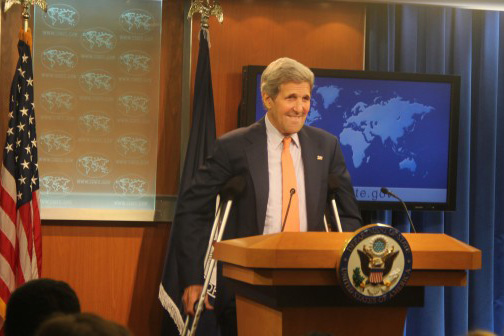WASHINGTON— After months of delay, Secretary of State John Kerry released a long-awaited report Thursday, raising concerns about human rights violations in Cuba and Iran, among other countries.
The 2014 Country Reports on Human Rights Practice was due to come out in February but was delayed amid speculation that the Obama administration was concerned about the impact on on-going negotiations with Iran over nuclear power.
However, State Department officials said the Iran talks had no effect on the timing of the release of the report. They said the delay was due to conflicts in Kerry’s schedule and his leg injury in a bike accident in France.
Improving relations with Cuba and Iran are among President Barack Obama’s priorities in his foreign affairs agenda.
Iran continues to severely restrict civil liberties, according to the report. The document drew heavily on non-U.S. government sources since the United States does not maintain an embassy in Tehran.
The State Department said the government of Iran officially announced 268 executions, though according to the Human Rights Watch World Report, the number is believed to be higher. In 2012, Iran carried out more than 544 executions, second in number only to China, according to Amnesty International, which said at least 63 people were executed in public.
The negotiations on conditions for Iran’s nuclear program have taken more than a year of talks between the U.S. and Iran. The talks face a diplomatic deadline Tuesday for settlement of a deal.
As for Cuba, the report said the island nation has continued human rights violations, barring its citizens’ access to uncensored information and severely restricting Internet availability. The report acknowledged that Cuba indicated “a willingness to consider expanding telecommunications investment on the island,” which would create more Internet access in the future.
The report also noted the release of 53 political prisoners in Havana as a consequence of the Dec. 17 agreement to re-establish diplomatic relations between the U.S. and the Cuban government. Cuba’s willingness to allow greater access by the UN and the International Committee of the Red Cross is also cited.
Human rights have taken a turn for the worse in some regions of the world because of terrorist organizations such as the self-proclaimed Islamic State, Al Qaeda, Boko Haram, al-Shabaab and the Nusra Front. These groups, the State Department said, have “perpetrated human rights abuses and violations of international humanitarian law against innocent non-combatants.”
More than 3.2 million were forced to flee Syria and have been classified as refugees by the office of the United Nations High Commissioner due to the ongoing civil war. The State Department singled out Syrian President Bashar Al Assad for his part in the bloodshed. As a result, the so-called Islamic State was able to take advantage of this instability and gained territories and members.
Saudi Arabia, one of the U.S.’s major allies, was criticized for the prosecution of Internet activist Raif Badawi, and also for abusing detainees.
The delayed release of the report sparked outrage for some lawmakers, including, Sen. Ted Cruz, R-Texas, who wrote in a Washington Times op-ed, “the issue of Iran’s abysmal human rights record is inextricably intertwined with its nuclear ambitions.”







